No, cats do not eat pigeons.
A feral cat who is very hungry may eat some of a pigeon, but most well-fed healthy domestic cats will not eat a pigeon.
However, they will kill pigeons.
The reason for this is because it is relatively easy (with an abundance of pigeons) and they find it fun.
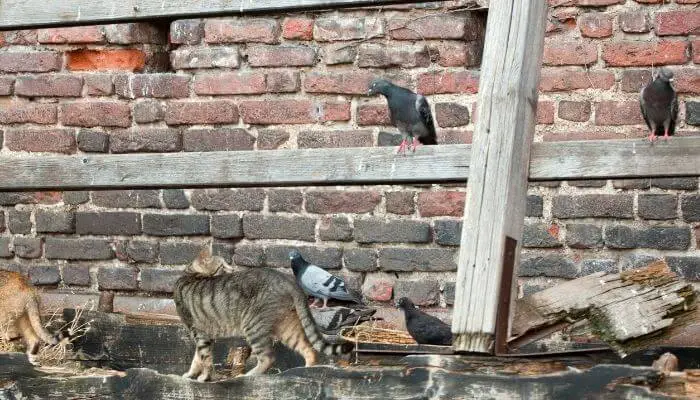
Domestic cats do not kill to eat pigeons.
But, does a cat have a paw in the untimely demise of a pigeon? Sometimes, yes it does.
Do Cats Never Eat Their Victims?
There are a few times when cats will have a nibble on what they have killed, but in most cases, it is a nibble for the sake of something to do.
The idea that cats eat their victims is because we usually see half-eaten birds and rodents on our lawns, but where a cat may be involved, it isn’t usually the cat that is doing the eating.
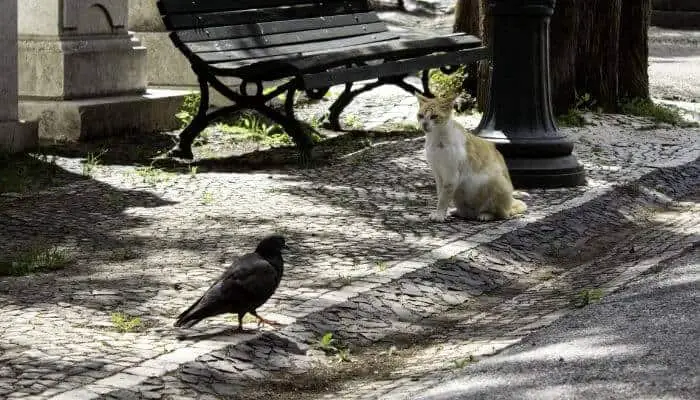
Again, some cats will have a nibble, but if you are a cat owner, you will know how fussy cats can be about their food.
If they won’t accept the cheap tinned stuff you bought last week, why would they chow down on a pigeon?
When Your Cat Brings a Present
Perhaps some of the strongest evidence that cats don’t eat pigeons is when you are sat in your living room watching reruns of Bob’s Burgers, and your fluffy little kitty drops a half-alive pigeon on your lap.
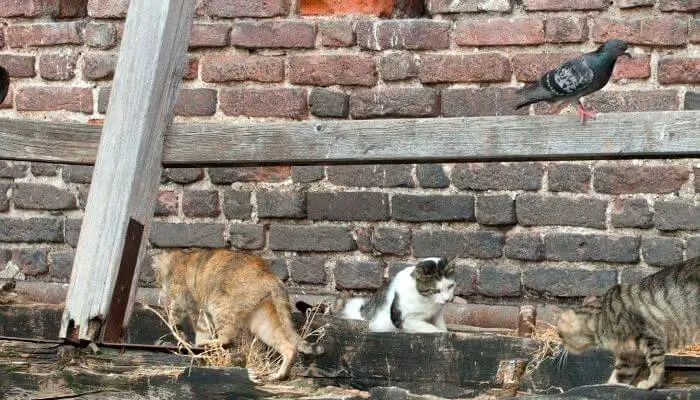
Take note that most of the presents your cat brings you are often half alive or recently dead.
Those little presents they drop in your shoes are not eaten.
If your cat is bringing pigeons home for you, then note how they may look rough, but have not been eaten.
What About Eviscerated Pigeons?
There are several explanations for why you may see a torn apart pigeon on your lawn.
If you walk out in the early hours of the morning and there are feathers everywhere, then it was very likely a bird of prey.
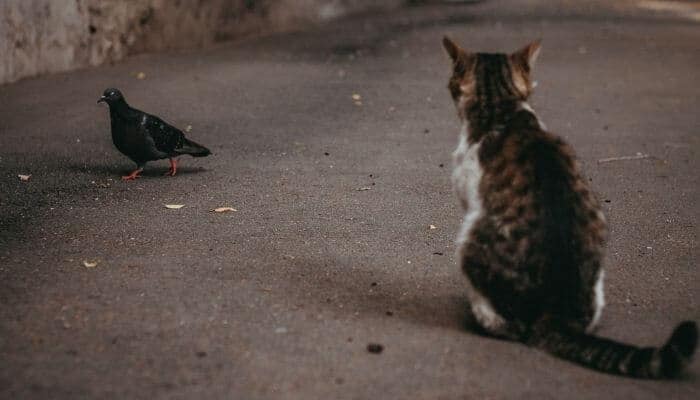
They will typically tear the flesh from other animals and eat all they can because in most cases they cannot carry the carcass a long distance.
As mentioned below, it is possible for a cat to pull apart a pigeon and make a mess but cats are much more likely to pull apart a rodent than a bird.
Bird carcasses are best cut (like with talons and beaks) than torn (with teeth and claws).
What Eviscerated Mice?
In this case, a cat may be to blame.
Sometimes their tiny victims die too quickly, and the cat still wants to play, so it starts playing with the entrails.
Again, it isn’t really eating the creature, it is messing around with its guts and its insides.
This is somewhat of a personality quirk with some cats because different cats do things very differently.

For example, cats from the same litter will do very different things even when living with their siblings.
One “messy playing” cat may spread mouse entrails all around your new wooden decking, while its brother sits and watches her do it.
However, with that said, where the cat may be the killer, it isn’t always the entrails spreader.
There are lots of other creatures that may take apart a rodent.
This is especially true when two or more creatures start fighting over the carcass.
Cats will have a tug on a pigeon, but it takes a lot of work to get through the feathers, skin and bones.
Where a bird of prey can pull a pigeon apart bit by bit, it is a lot of work for a cat to pull apart a pigeon.
What About The Headless Pigeons We See?
That is always a cat.
For some reason, once a cat has finished torturing its victim and the creature has died from the shock and pain, then the cat will bite off its head.
The reasons why cats bite the heads off their victims is a complete mystery.
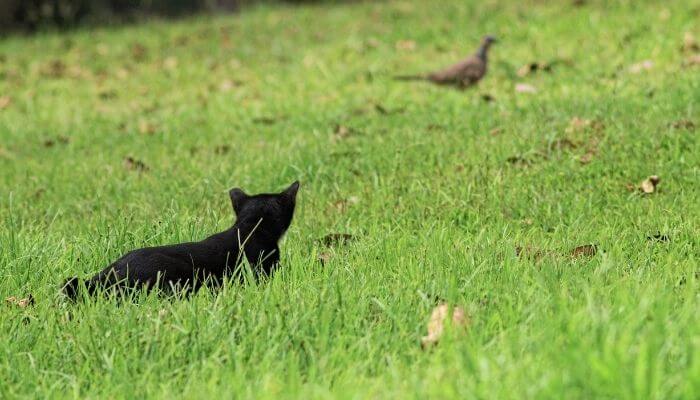
There is no reliable scientific evidence as to why domestic cats do it.
Some interesting observations were made with regards to how long the prey takes to hunt and how cats take off heads if it was a longer hunt, but these observations were never confirmed as true.
The most probable explanation is that taking off the heads of smaller animals is easy, so some cats simply choose to do it.
Nevertheless, if there is a headless pigeon carcass in your garden, then a kitty was to blame.
Note: If you find a dead pigeon in your garden follow these steps to dispose of it safely.
What About Feathers And No Carcass?
A cat may have had a hand in this scenario, but it is not likely.
The cat is going to make a clean kill and then either play with the carcass or drop it off somewhere.
You may blame the birds for the feathers in some cases, but it takes a big bird like a buzzard to carry off a pigeon carcass.
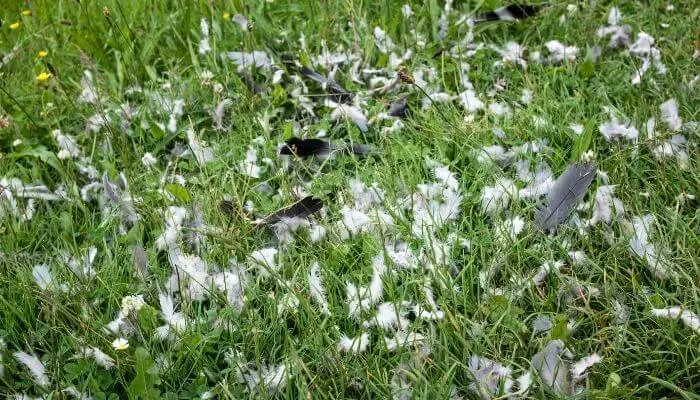
In most cases, when there are feathers but no body, then a predatory or scavenger mammal is to blame.
In most cases, they have taken the bird off to their nest or to a secluded area where they can eat it.
A cat may have had a hand in the killing, and a predatory mammal has no problem scaring a cat away from its toy, but feathers and no carcass is usually the work of a predatory wild mammal.
What About The Smelly Discovery?
When you are walking to catch a bus and you can’t help but notice the many flies coming out of a small shrub or bush.
Or, you are in your garden and you notice a foul smell coming from the area with upturned plant pots.
When you make a smelly discovery of what used to be a pigeon, then a cat may have been to blame, but only for the kill.
As mentioned earlier, cats will kill something and then leave it somewhere when they get bored.
Some will take the carcass with them for a while until they get bored and drop it somewhere.
When they do, rodents like rats or other scavengers will get their paws on the carcass.
Scavenger animals will never eat out in the open unless they have no choice (like when mice eat the fallen apples off your tree), or unless it is dark and very quiet.
In most cases, a scavenger creature like a rat will drag the carcass off to a secluded and dark place.
Some opportunistic predators will do this too, but not as often.
That is why you find the carcass a few days later when the flies have started to congregate or the smell has become noticeable.
You find the rotting remains of what was once a pigeon.
Finding a Perfect-But-Dead Pigeon
Again, there is a chance that a cat was to blame for killing the bird.
The bird may have been caught by a cat and then died of shock, or the bird may have bled out but you can’t see the blood because it clogs together in the bird’s feathers.
However, though a cat’s reputation seems earned, it is a little unfair that every dead pigeon is often blamed on cats.
If the bird is in pretty good condition, then it may have died of natural causes. It may have been ill, or had eaten something it shouldn’t have, or maybe even had cancer.
When you see a dead pigeon on your travels, know that a cat is not always to blame.
Sometimes, birds die.
Are Cats Never to Blame?
As noted in this article, cats get the blame too often for eating pigeons.
When a pigeon is dead, it is fair game for every magpie, seagull, bird of prey, predatory mammal and scavenger creature.
The cat may have a hand in killing the pigeon, but there are a lot of creatures waiting around to do the eating.
Yes, a cat will occasionally eat a bird.
It will eat a frog, rodent or snake if it wishes, but in most cases, a healthy domestic cat will not eat a pigeon.
If they do, they will go for the tastier meatier parts and then lose interest.
Unless a cat is feral, ill or very hungry, it will hunt a pigeon, torture it a little while, and maybe even play with its carcass, but it very rarely will eat it.
